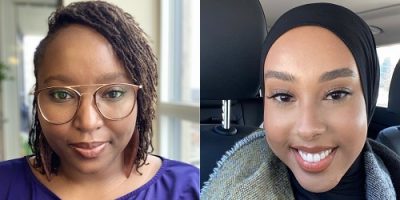From hesitance to confidence: ACCHO’s new COVID-19 vaccine video

The African and Caribbean Council on HIV/AIDS in Ontario (ACCHO) is a provincial coalition of organizations and individuals committed to HIV prevention, education, advocacy, research, treatment, care and support for African, Caribbean and Black (ACB) communities. They spoke to CATIE about the impact of COVID-19 in ACB communities, and their efforts to improve vaccine confidence.
How has the COVID-19 pandemic affected African, Caribbean and Black (ACB) people in Ontario?
ACB populations have been disproportionately affected by the COVID-19 pandemic, not only in terms of rates of infection, but also by the economic fallout of the pandemic. Pre-existing vulnerabilities and marginalization among ACB communities, largely connected to anti-Black racism, have left ACB communities directly in the line of fire. Many essential and frontline workers are from ACB communities, often earning minimal wages and not eligible for sick pay. Many are living in conditions that leave them vulnerable to infection, or are left behind because they cannot pivot to virtual working and at-home schooling. And now, we are seeing that our communities are being left behind by the vaccine roll-outs.
There has been a lot of talk about vaccine hesitancy, particularly among racialized communities. Have you found that this is an issue in the communities you work with?
There are vaccine-hesitant individuals among all demographic groups, including some in the ACB communities we serve. One reason for this is mistrust of the medical system ─ a direct result of the ongoing, systemic racism that is part of our healthcare system.
Another reason is the lasting impact of past unethical practices toward Black and Indigenous populations. The Tuskegee Experiment is not the only biomedical injustice committed in North America. Past and current injustices continue to reinforce medical and institutional mistrust, including vaccine hesitancy among ACB people.
Furthermore, since the onset of this pandemic, we have seen an alarming rate of misinformation spreading through ACB communities. This has only grown with vaccine roll-outs – we see half-truths and fabrications deterring vaccine uptake. This is why it was necessary for ACCHO and our partners to help dispel some of these myths and conspiracy theories and support ACB people in making informed choices for better health outcomes. There is always power in knowledge.
What has ACCHO been doing to confront the unique challenges faced by African, Caribbean and Black Canadians in the COVID-19 pandemic?
From the beginning of this pandemic, we knew that ACB communities would be especially vulnerable, so we acted quickly, often in partnership with other organizations serving ACB populations, to provide answers and access to services. We put out reliable information on how pandemic shut-downs would affect immigration and refugee processes. We ensured that our communities were aware of the variety of benefits being offered by different levels of government. We offered direct psycho-social support to our network of frontline workers, knowing that they would be bearing an even heavier burden during this time. We offered direct support and partnership to organizations serving ACB communities, including co-hosting a number of virtual events for ACB audiences.
And we also partnered with four community-based organizations – the Black Coalition for AIDS Prevention, St. Michael’s Unity Health Toronto, Taibu Community Health Centre and HiFi Toronto, to create this myth-busting video.
We continue to centre the pandemic in all our work as we understand that improving health outcomes cannot be done in a vacuum; it takes a holistic approach to make a true impact.
Why did you choose this format to communicate your message?
An animated video is relatable, easy to share, is culturally relevant in this case; it addresses serious issues in a familiar, simple and reassuring way. It is also the format through which much misinformation is spreading so we are “meeting people where they are”. We created this video based on facts, dispelling some of the most common vaccine myths and conspiracy theories circulating in ACB communities. This type of messaging will help ACB communities make informed choices, by engaging them in meaningful community-level dialogue.
How can service providers better engage communities of colour who may be hesitant to get vaccinated?
It is important for service providers to understand that vaccine hesitancy among ACB and Indigenous service users is not a mere coincidence, but rather it is a response to systems that continue to discriminate against them. It is important that service providers acknowledge that these concerns are valid and become agents of change in tackling systemic racism.
In order to protect our people, it is important to connect meaningfully with community and offer reliable information that can be used to make informed decisions. Our new video does all this!
Wanjiru Munene is the communications specialist at the African and Caribbean Council on HIV/AIDS in Ontario (ACCHO).
Ikran Ibrahim is a global health student who is motivated by and interested in healthcare policy, research and disease prevention. She is also very passionate about social justice, advocacy and promoting equitable health for marginalized communities.
